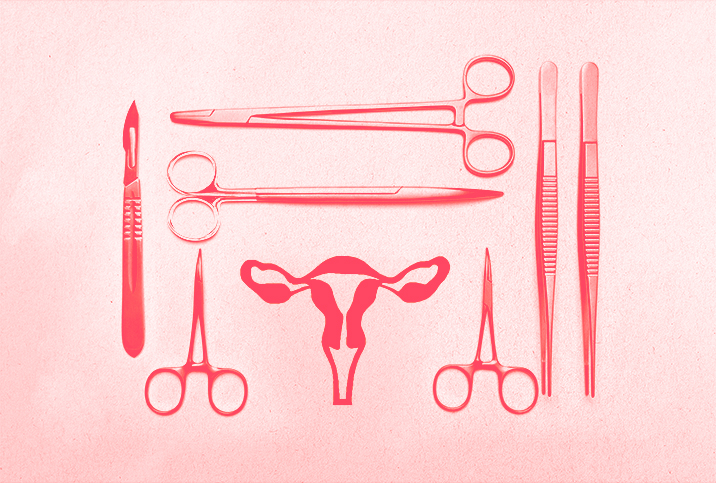How to Have Sex After Surgical Menopause

A majority of women go through menopause during midlife, typically in their 40s and 50s. For some, however, the process happens earlier, and for others it is artificially begun by surgical intervention.
Surgical menopause is triggered only when absolutely necessary because it demands a heavy price. Its effects on sexual function are numerous, making rejuvenating your sex life a complicated process.
Aside from some medical support, ultimately, this journey means stocking up on patience, self-love and self-care.
What is surgical menopause?
"Surgical menopause refers to the removal of both ovaries—bilateral oophorectomy—before normal menopause," said Amir Marashi, M.D., a board-certified OB-GYN in New York City and the founder of Cerē, a company that creates sexual health tools for women. "Normal menopause refers to the time around the last menstrual period. The average age of normal menopause is around 51 years."
The oophorectomy is usually carried out to treat gynecological health complications. Often, it is performed at the same time as a hysterectomy, which is the surgical removal of the uterus and may also involve removing the cervix, fallopian tubes, ovaries and other surrounding structures.
The potential motivations for performing surgical menopause are numerous, encompassing heavy menstrual bleeding, fibroids and uterine cancer.
"Another reason to remove both ovaries is to reduce the risk of ovarian cancer," Marashi continued. "Some people choose to have both ovaries removed due to endometriosis or chronic pelvic pain."
Measuring the physical and sexual impact
In addition to the four to six weeks of recovery time required after a bilateral oophorectomy, surgical menopause triggers menopausal symptoms. General physical side effects may include:
- Hot flashes
- Memory problems
- Heart disease
- Depression or anxiety
- Osteoporosis, a condition in which bones become weak and brittle
"At times, surgical menopause can be more challenging [than natural menopause] due to the abrupt decrease in hormones," said Tara Scott, M.D., an OB-GYN based in Fairlawn, Ohio. "In addition, we see testosterone levels decrease by 50 percent compared to natural menopause."
Ovaries are responsible for the production of estrogen—the sex hormone responsible for the development and regulation of the female reproductive system and secondary sex characteristics—so suddenly reducing levels triggers significant side effects.
"Low estrogen levels can cause clitoral atrophy, low libido, decreased lubrication, decreased pleasure and less chance of orgasm," Marashi said.
A lesser-understood symptom among these is clitoral atrophy, which occurs when the clitoris loses sensation. But the symptoms go beyond the physical.
"Surgical menopause can have a major impact on mental health," Marashi added. "Some people find it helpful to join support groups or communities with other people who are experiencing menopause, which can be a good venue to discuss symptoms and cope. It is also helpful to let a doctor or other healthcare professional know that you are struggling."
The psychological impacts of surgical menopause, which include increased stress, mood changes and lower self-esteem, can all have a knock-on effect on sexual function by creating mental blocks to engage with sexuality.
Managing the effects with medical intervention
"Hormone therapy can help mitigate some of the symptoms and ease the transition," Scott said. "Depending on their age, they should talk to their provider about options for hormone therapy. There are hormones that you can take vaginally that do not have the same risks as systemic hormone therapy."
People who have both ovaries removed are offered hormone replacement therapy (HRT) to manage the effects. People who have both the uterus and ovaries removed are typically prescribed estrogen replacement therapy. However, for those who have only the ovaries removed, as in surgical menopause, progestin is prescribed as well because prescribing estrogen alone increases the risk of uterine cancer.
HRT can help mitigate symptoms such as vaginal dryness and lowered libido. While HRT is not strictly necessary, patients should discuss the full spectrum of options with their physician before making a final decision for or against it.
Before engaging in sexual activity again, it's important to wait for your incision to heal and ensure that there is no lingering pain. Generally, though, a lengthy delay is not necessary.
"There is no need to wait before reengaging in sex after surgical menopause," Marashi said.
However, take your time. There is no rush if you do not feel ready to participate in intimate activity just yet or you need a little more bed rest.
Dealing with the effects at home
The first step to directly addressing the influence of surgical menopause on your sexuality is to communicate it to your partner.
Scott advised one way to describe it: "Literally like unplugging your phone and the battery dies."
Set aside plenty of time to talk through the changes your body is experiencing before diving back into sex. Do not get intimate without prior discussion, because it could open you up to psychological stress or physical pain.
"Open communication with a partner is very important," Marashi said. "There is no shame in explaining that you might need extra help or time to become aroused or lubricated. Sometimes it's helpful to put things in perspective for a partner: Although there are negative sexual effects of menopause, it's important to remember the benefits."
If you are struggling with symptoms like vaginal dryness or discomfort upon penetration, incorporate plenty of lube into your sexual routine. Make a game of it and try out different scents, flavors, colors and consistencies. Reframe this new sexual guest star as a fun challenge, not an interference. There are also "arousal gels" available that induce lubrication and get your juices flowing again.
And make sure to prescribe liberal pleasure to the bedroom. Clitoral stimulation—by hand or with toys—increases blood flow to the area and can ease symptoms. Perhaps take the time to do this solo during bed rest to explore any changes in sensation or arousal before introducing a partner.
Above all, take your time. A healthy body is a precious resource and it should not be rushed to replicate your old sex life before it's ready. There will be plenty of opportunities to rebuild and rejuvenate your sexual satisfaction. Just take it one session at a time.


















